|
|
|
Sort Order |
|
|
|
Items / Page
|
|
|
|
|
|
|
| Srl | Item |
| 1 |
ID:
147534
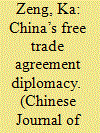

|
|
|
|
|
| Summary/Abstract |
This article assesses the relative importance of political and economic factors in shaping China’s free trade agreement (FTA) strategy since the country’s accession to the World Trade Organization (WTO) in 2001. Event history analysis of the time lapse before China signed an FTA with a given partner country lends substantial support to arguments emphasizing the political motivations behind China’s choice of FTA partner. The Chinese leadership has undoubtedly signed more FTAs with countries that have similar state preferences. However, there is far less overwhelming evidence to suggest that China’s FTAs are motivated by economic considerations. While Beijing has indeed signed more FTAs with countries on which it depends heavily for imports, there is scant evidence to show that China’s FTAs are designed to enhance market access abroad, or to secure essential supplies of raw materials. Finally, the study analyses the importance of multilateral and regional trade liberalization in shaping China’s FTA policy choices, and finds that, as a major trading nation, China may not be significantly influenced by the competitive dynamics of regional trade liberalization when formulating its FTA strategy.
|
|
|
|
|
|
|
|
|
|
|
|
|
|
|
|
| 2 |
ID:
175855
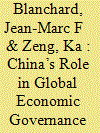

|
|
|
|
|
| Summary/Abstract |
A large proportion of debates about China’s impacts on global economic governance lack systematic empirical analysis. We engage the debate about if China is a revolutionary, revisionist, or status quo state through a deep dive into China’s behaviors with respect to Bilateral Investment Treaties (BITs). This research strategy is à propos because BITs represent the de facto regime governing foreign direct investment (FDI) globally, and China is the world’s second largest signatory of BITs. Drawing upon a database that we created using material on BITs available from the United Nations Conference on Trade and Development, we systematically examine the substantive and procedural provisions of China’s BITs from 2000 onward. Using a qualitative methodology discussed in-depth in our article, we also put China’s BIT practices in comparative perspective by comparing them against the BIT practices of Japan, a leading developed economy with BIT practices reflecting those of other established economies. Our multivariate analysis demonstrates China is not a revolutionary or dramatically revisionist player with respect to BITs. It champions positions that are neither hyper-conservative (state friendly) nor hyper-liberal (FDI friendly). To be more precise, China’s policies, especially with respect to substantive provisions, tend to be conservative, with, to some extent, some liberal aspects. Our analysis, then, indicates that commentators, businesspeople, and policymakers should be cautious about proffering claims that China is dramatically reshaping global economic governance. Aside from this important contribution to the debate, our work also expands knowledge about China’s BITs specifically and BITs generally, which does not reflect adequate attention to BITs from East Asian countries.
|
|
|
|
|
|
|
|
|
|
|
|
|
|
|
|
| 3 |
ID:
079487
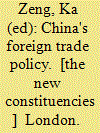

|
|
|
|
|
| Publication |
London, Routledge, 2007.
|
| Description |
x, 183p.Hardbound
|
| Standard Number |
9780415770866
|
|
|
|
|
|
|
|
|
|
|
|
Copies: C:1/I:0,R:0,Q:0
Circulation
| Accession# | Call# | Current Location | Status | Policy | Location |
| 052919 | 382.30951/ZEN 052919 | Main | On Shelf | General | |
|
|
|
|
| 4 |
ID:
181616
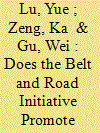

|
|
|
|
|
| Summary/Abstract |
This paper examines the role of the Belt and Road Initiative (BRI) in enhancing political relations between China and its partner countries. We postulate that an international economic cooperation scheme such as the BRI may facilitate commercial exchanges and increase the participating countries’ economic gains. This should generate incentives for these countries to avoid political tensions that may jeopardize mutually beneficial economic exchanges, and to expand the constellation of domestic coalitions in support of cordial diplomatic and political relations. We test the effect of the BRI on bilateral political relations using data on political relations between China and 91 countries along the BRI route between 2006 and 2018. Treating the promulgation of the BRI in 2013 as a policy shock, our difference-in-difference analysis lends substantial support to our hypotheses. Further analyses of the underlying causal mechanisms suggest that the BRI bolsters political relations by strengthening economic ties with partner countries through trade and investment related to economic cooperation.
|
|
|
|
|
|
|
|
|
|
|
|
|
|
|
|
| 5 |
ID:
142077
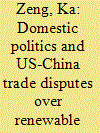

|
|
|
|
|
| Summary/Abstract |
In this article I draw on the two-level game approach to analyze the influence of domestic politics on US-China trade disputes in alternative energy, especially in solar energy. I suggest that the difficulty Washington faces in getting China to address market access barriers in alternative energy needs to be viewed in light of both the coalitional dynamics in the United States resulting from the specific bilateral trade and investment relationship in this sector and Beijing's willingness to use industrial policy to foster economic competitiveness in nascent industries. Specifically, as China occupies the middle of the supply chain in the solar industry, both downstream users of low-cost Chinese imports and exporters of upstream products to China have voiced strong concerns about US trade action. Such domestic opposition, coupled with the importance of industrial policy for defending the country's long-term interests in a “strategic emerging” sector such as alternative energy, substantially constrains Washington's ability to influence Chinese policies.
|
|
|
|
|
|
|
|
|
|
|
|
|
|
|
|
| 6 |
ID:
179935
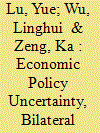

|
|
|
|
|
| Summary/Abstract |
This paper examines the effect of bilateral investment treaties (BITs) in promoting outward Chinese foreign direct investment (COFDI) in the presence of rising economic policy uncertainty in China’s partner countries. We postulate that the signing of BITs should help stimulate COFDI because the treaties send a credible signal to foreign investors about the host country’s intent to protect Chinese investment, and make it more difficult for the host country to violate its treaty obligations. BITs that contain rigorous investment protection and liberalization provisions, in particular, should be more likely to encourage COFDI as they directly influence Chinese investors’ expectations about the stability, predictability, and security of the host market. However, while BITs generally promote COFDI, host country economic policy uncertainty may also limit their effectiveness. This is because uncertainty tends to undermine investor confidence, trigger capital flows from high- to low-risk countries, and dampen commercial activities. Poisson pseudo-maximum likelihood (PPML) estimation models of the determinants of COFDI to 188 countries between 2003 and 2017 lend substantial support to our conjectures.
|
|
|
|
|
|
|
|
|
|
|
|
|
|
|
|
| 7 |
ID:
118947


|
|
|
|
|
| Publication |
2013.
|
| Summary/Abstract |
This paper examines United States (US)-China trade disputes under the World Trade Organization (WTO) and argues that both countries are increasingly resorting to the WTO's dispute settlement mechanism to target issues of most critical concern to their respective domestic constituencies. While the United States' WTO complaints against China tend to challenge Chinese industrial policy, cases involving anti-dumping and countervailing duties dominate China's WTO disputes against the United States. In addition, the significant expansion of bilateral trade relations in the past decades has provided opportunities for Chinese leaders to identify or to threaten retaliation against anti-protectionist groups in the United States in order to mobilize them against the disputed measure. Overall, United States-China trade disputes under the WTO increasingly reflect a distinctive political logic whereby domestic political considerations not only figure prominently in the decision to launch WTO disputes, but also frequently influence the way the dispute is played out either within or outside of the WTO framework.
|
|
|
|
|
|
|
|
|
|
|
|
|
|
|
|
| 8 |
ID:
079955
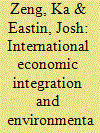

|
|
|
|
|
| Publication |
2007.
|
| Summary/Abstract |
This paper tests propositions advanced in previous theoretical literature about the impact of international economic integration via trade and investment on environmental protection with a case study of China. We hypothesize that instead of leading to additional environmental degradation, increased openness to trade and foreign investment results in an overall improvement in environmental quality by acting as a transmission belt for superior regulatory standards and environmental technology from China's key export markets. Additionally, pressure for enhanced environmental regulation and product standards from principal developed-world importers of Chinese goods may induce Chinese firms to self-regulate rather than attempting to reduce the cost of their exports by lowering environmental standards. Statistical analysis of the variation in environmental performance across China's regions from 1996 to 2004 lends support to this hypothesis, indicating that rather than leading regions to engage in a "race to the bottom" with the lowering of environmental standards, increased trade and investment encourages more stringent policy enforcement and compliance
|
|
|
|
|
|
|
|
|
|
|
|
|
|
|
|
| 9 |
ID:
098099
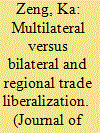

|
|
|
|
|
| Publication |
2010.
|
| Summary/Abstract |
In recent years, at the same time it has pursued multilateral trade negotiations via membership in the World Trade Organization (WTO), China has embraced a regional approach to trade liberalization by negotiating a number of bilateral or regional free trade agreements (FTAs) with its trading partners. This paper examines China's increasingly active FTA diplomacy and seeks to explain China's motives for pursuing expanded FTAs. Specifically, this paper argues that while China's FTA activism reflects considerations about enhancing China's influence in the Asia-Pacific region, capturing the economic gains of FTA participation, and minimizing the trade and investment diversion resulting from the competitive dynamics of regional trade liberalization, the move toward expanded FTAs is also consistent with the desire to create alternative bargaining forums over trade issues that could help to stabilize expectations as well as the need to use FTAs to control the pace of trade liberalization so as to accommodate protectionist pressure emanating from domestic interest groups. In particular, this paper highlights the impact of domestic politics on China's FTA negotiations through a detailed discussion of how pressure from protectionist seeking interests influences the scope and depth of China's FTAs.
|
|
|
|
|
|
|
|
|
|
|
|
|
|
|
|
| 10 |
ID:
064552


|
|
|
| 11 |
ID:
163465


|
|
|
|
|
| Summary/Abstract |
The Belt and Road Initiative (BRI) is often regarded as a vehicle of China's economic statecraft in that country's endeavour to expand its geopolitical influence overseas through investments and trade. In today's globalized world, however, the vast majority of international economic interactions are conducted by firms, not states. The success of the BRI therefore depends on whether and how China can compel its firms to behave in a way that serves the strategic interests of the state. Using a unique firm-level survey, we find that Chinese firms' interests in the BRI do not necessarily align with those of the state. Despite similar perceived risks and challenges to participation in the BRI among private and state-owned firms in China, state-owned enterprises are much more likely than private ones to express a willingness to participate in the BRI. These findings highlight the importance of state control in the exercise of economic statecraft.
|
|
|
|
|
|
|
|
|
|
|
|
|
|
|
|
| 12 |
ID:
143775


|
|
|
|
|
| Summary/Abstract |
This article explores the domestic and international factors that influence the strength of investment protection and liberalization provisions embedded in China’s bilateral investment treaties (BITs). It hypothesizes that China is more likely to sign stringent BITs following the leadership’s implementation of major reform initiatives; when the partner country possesses strong democratic institutions that not only allow domestic interest groups with strong interests in legalization to press for their policy preferences, but also reduce the leaders’ aversion to signing highly legalistic international agreements that bind their behavior; when divergent diplomatic interests render informal negotiations a less viable means of dispute resolution. Statistical analyses of the stringency of the key provisions included in 71 Chinese BITs signed between 1982 and 2011 lend substantial support to the above hypotheses.
|
|
|
|
|
|
|
|
|
|
|
|
|
|
|
|
|
|
|
|
|